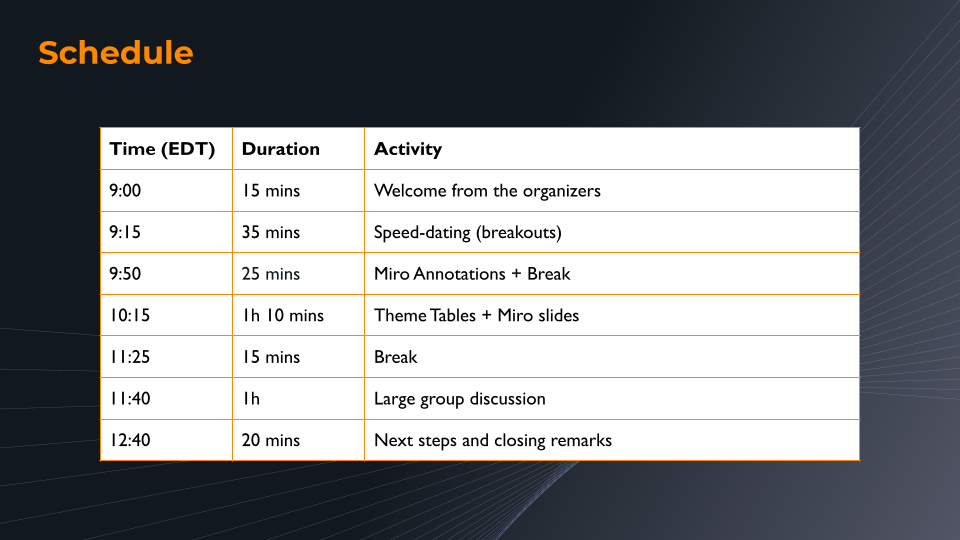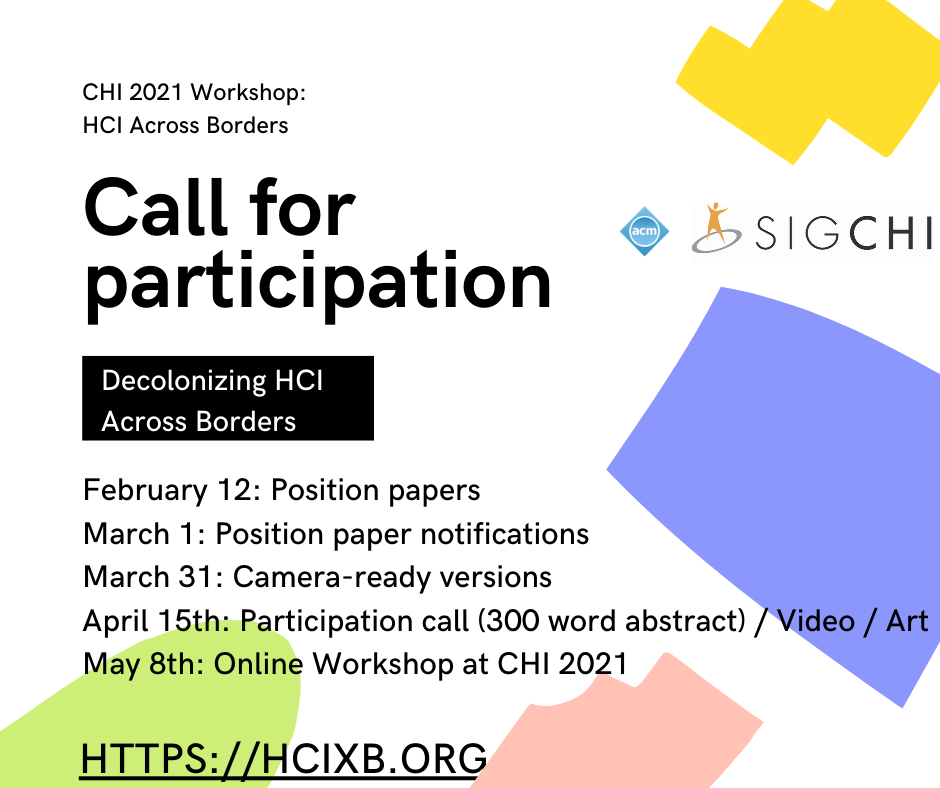About HCI Across Borders (http://www.hcixb.org)
The HCI Across Borders (HCIxB) symposium at CHI (initially held as the Development Consortium at CHI 2016, then as a symposium 2017-2019) has evolved into a critical collaborative effort to bring together researchers working in and across under-represented contexts around the world. Our mission has been to foster community across geographies, backgrounds, methodologies, and other borders. To achieve this, we have explored building bridges with the larger HCI community and creating concrete mentorship opportunities for supporting HCIxB researchers in publishing at impactful venues such as CHI.
Theme for 2021: Decoloniality
For 2021, we expect to regroup to reflect on ‘decolonial’ thinking in our research and education across borders. Through our discussions, we hope to recognize the borders that coloniality has created in computing, design, and education. Our focus on decoloniality draws on our endeavors to sustain this tradition of supporting collaborations in HCI across borders and reflecting on new ways to adapt HCI to broader audiences to create pluriversal knowledge. We expect our workshop session at CHI 2021 to branch into a series of virtual workshops that will continue conversations on decoloniality and other themes that are relevant to borders in HCI, from the perspectives of students, practitioners, educators, early career researchers, etc. through the year.
Inspiring Work on Decoloniality:
- Videos: https://www.facebook.com/CMUDesign/videos/411199056610807
- Papers: https://sites.google.com/view/decolonizinglearningspaces/inspiring-work?authuser=0
Our workshop microboard
Schedule
HCIxB will take place on Saturday, as a one-day workshop. Our tentative schedule is below, though it is subject to change, and will be finalized after we have reviewed the submissions. All updates will be indicated on our website (http://www.hcixb.org).

Access documents during the session
- Phone Book – Link
- Miro Borad – Link
- Join Discord – Link
Accepted Submissions 2021
Submission can include
- (A) Presenter:
- Paper: 2-4 pages position paper which will be entitled to be a presenter and get your position paper published in HCIxB web and other open platforms e.g. CEUR-WS platform
- (B) Attendee: a 300 word abstract or any other creative artifact that provides an opportunity to engage in discussion, learn from experiences, and describes their perspectives.
Example submissions might include, but are not limited to, the topics below (from previous years):
• Education technology use by Latino immigrant parents in the United States
• Creation of e-mentorship opportunities to bridge the rural-urban divide in the United States
• Digitization of informal savings in Pakistan
• Introduction of medical chatbots to improve health-care delivery in Kenya
• Media reconstruction and archiving on Cambodian Facebook
• Community-led video education for digital financial services in India
For examples of accepted submissions in previous years, please see:
2020: https://hcixb.org/past_events/chi2020/submissions-2020/
2019: https://hcixb.org/chi2019/accepted-papers/
2018: https://hcixb.org/chi2018/participants/
2017: https://hcixb.org/2017-2/accepted-papers-authors/
2016: https://hci4dacrossborders.wordpress.com/
All submissions will be reviewed by our program committee, and their acceptance will be conditional on their potential to contribute to the HCIxB community and to foster discussion and growth among participants. Authors of accepted submissions will be invited to bring poster versions of their submissions at CHI. We will invite seasoned HCI researchers in relevant areas to provide rich feedback to symposium participants. A selection of accepted submissions will be invited to make short oral presentations.
Please note that accepted submissions will not be indexed in the ACM DL but will be listed on the HCIxB website for participants to read before attending CHI. Through March and April, we will publish submissions as blog posts (on https://medium.com/hccxb). Please check http://www.hcixb.org for relevant information, and email admin@hcixb.org with questions.
Organizers
(in alphabetical order)
Christian Sturm, Hamm-Lippstadt University of Applied Sciences, Lippstadt, Germany
Dilrukshi Gamage, University of Moratuwa, Moratuwa, Sri Lanka
Heike Winschiers-Theophilus, Namibia University of Science and Technology, Windhoek, Namibia
Juan Fernando Maestre, Indiana University, Bloomington, Indiana, USA
Marisol Wong-Villacres, Georgia Institute of Technology, Atlanta, GA, USA
Naveena Karusala, University of Washington, USA
Neha Kumar, Georgia Institute of Technology, Atlanta, GA, USA
Oscar Lemus, Indiana University, Bloomington, Indiana, USA
Pedro Reynolds-Cuéllar, Massachusetts Institute of Technology, Cambridge, MA, USA
Teresa Cerratto Pargman, Stockholm University, Kista, Sweden
Vikram Kamath Cannanure, Carnegie Mellon University, Pittsburgh, PA, USA
Contact
Email us your questions at admin@hcixb.org
